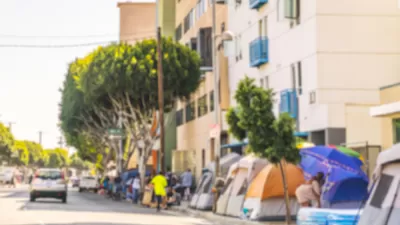Researchers at the Pew Charitable Trust have found that the neighborhood in which a child is raised is a powerful indicator of adult economic success.
There have been many ideas about how to predict success from childhood environment. The Freakonomics crowd found that the number of books in a child's home was an accurate indication of success in elementary school. The number of words spoken to a child early in life has also been found to predict literacy rates and test scores. But recent research suggests that, over the course of a lifetime, the neighborhood in which a child is raised is the best way to determine their likelihood to remain at or achieve middle-class economic status. "Researchers have found that being raised in poor neighborhoods plays a major role in explaining why African American children from middle-income families are far more likely than white children to slip down the income ladder as adults.
"The Pew Charitable Trusts Economic Mobility Project caused a stir two years ago by reporting that nearly half of African American children born to middle-class parents in the 1950s and '60s had fallen to a lower economic status as adults, a rate of downward mobility far higher than that for whites."
"Black children in neighborhoods in which poverty fell by 10 percent had higher incomes as adults than those who grew up in areas where the poverty rate stayed the same. This is a sign, they said, that simply improving the overall economy and quality of a given neighborhood can have beneficial effects on those growing up in it.
"The report does not address whether middle-income blacks should move to low-poverty areas for the sake of their children's future prospects. It is a thorny question -- many middle-income blacks have remained in high-poverty areas partly because of segregated housing patterns. And if they were to move elsewhere, the poverty rates in the areas left behind would rise."
Thanks to Franny Ritchie
FULL STORY: Neighborhoods Key to Future Income, Study Finds

Planetizen Federal Action Tracker
A weekly monitor of how Trump’s orders and actions are impacting planners and planning in America.

Maui's Vacation Rental Debate Turns Ugly
Verbal attacks, misinformation campaigns and fistfights plague a high-stakes debate to convert thousands of vacation rentals into long-term housing.

San Francisco Suspends Traffic Calming Amidst Record Deaths
Citing “a challenging fiscal landscape,” the city will cease the program on the heels of 42 traffic deaths, including 24 pedestrians.

Amtrak Rolls Out New Orleans to Alabama “Mardi Gras” Train
The new service will operate morning and evening departures between Mobile and New Orleans.

The Subversive Car-Free Guide to Trump's Great American Road Trip
Car-free ways to access Chicagoland’s best tourist attractions.

San Antonio and Austin are Fusing Into one Massive Megaregion
The region spanning the two central Texas cities is growing fast, posing challenges for local infrastructure and water supplies.
Urban Design for Planners 1: Software Tools
This six-course series explores essential urban design concepts using open source software and equips planners with the tools they need to participate fully in the urban design process.
Planning for Universal Design
Learn the tools for implementing Universal Design in planning regulations.
Heyer Gruel & Associates PA
JM Goldson LLC
Custer County Colorado
City of Camden Redevelopment Agency
City of Astoria
Transportation Research & Education Center (TREC) at Portland State University
Jefferson Parish Government
Camden Redevelopment Agency
City of Claremont



























